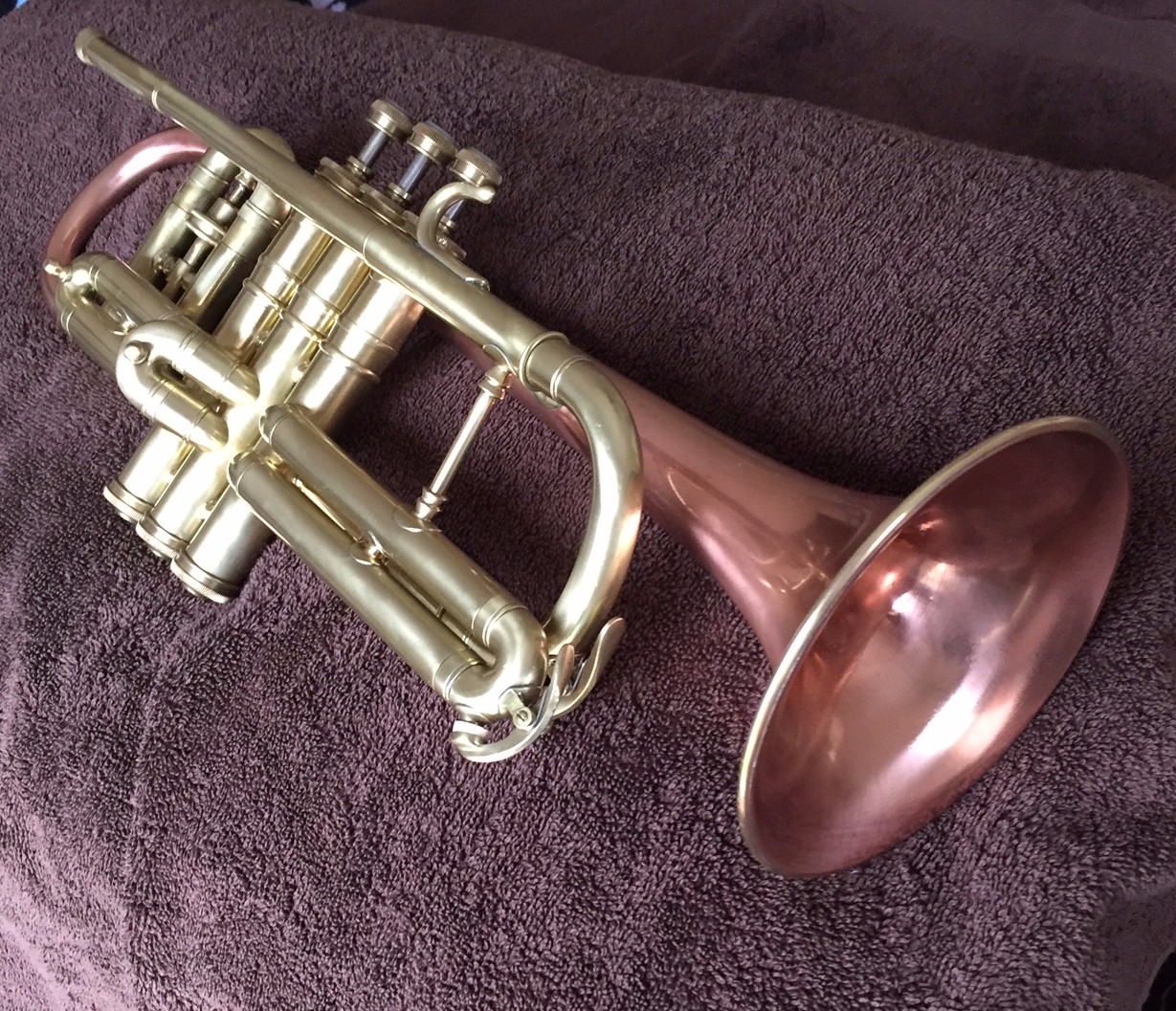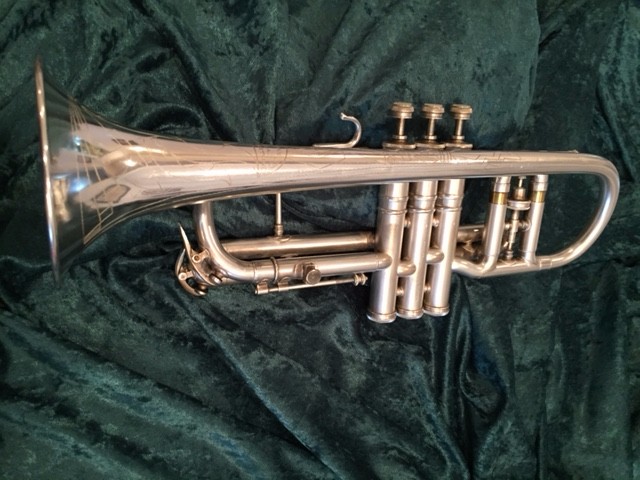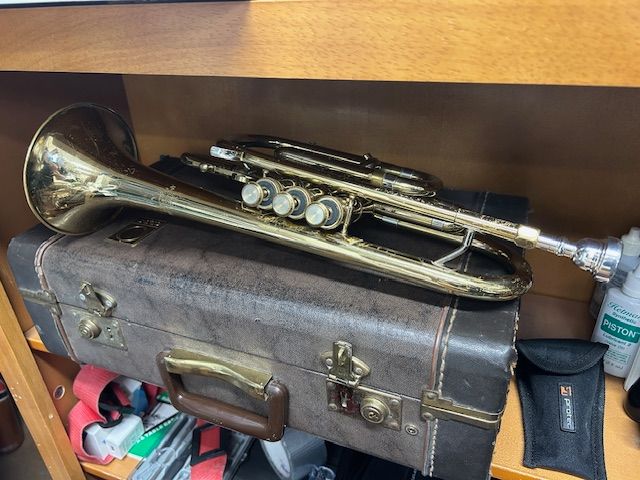Sometimes you have to make your own.

@adc said in Favorite Cornet:
Nice. I can't stand to play a new (old) horn until I thoroughly clean and sanitize it.
I can't stand to wait. I play it right out of the box the minute I get it. Then I take it in for cleaning and repairs. I also want to know the before and after of that process.
After:

Well, since this thread popped up, I'll relate a recent occurance.
Last Saturday was the first band practice in over a year. Trad jazz. New band. Never met these people before in person.
For a year I've practiced playing from lead sheets and doing improv. Occasionally use backing tracks. But mostly just improvising on the songs. I start in a different key and practice that too.
I wondered how it would all sound when playing with others. The answer? Wow, pretty darn well. The pandemic has given me the time to work on improv in the safety of my own home.
Now I say, "Give me the solo, man!"
Any theory involved in what I did? No. But also I've spent a year listening to a lot of music in this style. So that gets internalized and comes out.
Would it happen if I listened to another style. Yes. Works that way too. Listen, internalize, play and away we go.
I think it also relates to math ability. Rhythms seem to be a problem for people. It's not the notes, it's the rhythm. People get lost. Also having the beat in the back of your head that allows you to know where in the measure you are is huge. I've been in so many groups where a difficult passage means the player slows down and is immediately lost.
And then there is the reading text issue related thing. When you read text, do you look at all the letters? Of course not. You read the sentence. Same thing in music. You read the phrases. You see the whole line. No?
Or are you thinking of how to produce the sound and playing and can't spare attention to the music?
I think there's something like that going on?
I was in a bar band in high school. This was one of the songs that we really played well. Very popular.
Oh yea, bar band, teenagers playing in bars, it was the early 70's. I'm guessing it wouldn't happen these days. Our lead singer always got lots of female attention. Bar ladies loved that guy. Only a skosh older than him. Heh.
Good read and a very good site for musicians:
[link text](https://www.musicianswell.com/stories/2019/4/16/michael-atkinson-overuse-and-the-pitfalls-of-going-it-alone[link text](link url))
In my world, that means whenever you are doing anything like driving, chores, working out or any activity where listening is possible, immerse yourself in the target music. The next time you pick up the horn, that music will come out. Happens to me all the time.
@georgeb said in Traits that make a great sight reader?:
@dr-go said in Traits that make a great sight reader?:
I believe the hardest part of sight reading is being able to count. What really trips me up the most is reading where NOT to play (the rests) more so than were TO play (the notes). It all comes down to the rhythm, the feel of the song. That is what I find most challenging regarding sight reading.
I would have to agree with Doc on this part of sight reading, especially the rhythm. I don't realize how wrong I sometime get this in new pieces until I am playing with others. Then it all falls into place.
I've always found sight reading easy. But with difficult rhythms, I still use a pencil to mark downbeats in a measure. I've had band mates try this and they were amazed at how much it helped. I'm surprised at how little people mark their music to help themselves.
Ton of free stuff here. Really good information. I would work thought all the material.
[link text](http://www.bbtrumpet.com/home-page/[link text](link url))
@Dale-Proctor Sometime ago I was helping clean out my brother-in-law's storage unit. There I see an Olds Ambassador cornet in a case. It belonged to my nephew when he was in middle school or something like that. I took it home and had it cleaned and straightened. For the last few months it has been sitting by my side in my practice room. It does everything I could ask a horn to do and it does all that easier than all my other horns. It sort of feels like I don't need the twenty something trumpets and cornets I have sitting around. Who knew a little cornet like that would be that great.

I suppose the good news when spending large amounts of cash for a vintage trumpet is that when you have to have the valves rebuilt, the cost seems less?
I'm not buying anything vintage anymore because I'm tired of that problem. I have one trumpet built in 1937 with perfect valves. How that happened, no idea. But all the other horns built before 1960 have some level of issues.
In 60 years of playing, I've never seen red rot. Some of my horns are well over a hundred years old. I don't swab or put oil down the lead pipe. I rarely give my horns a bath. If they get gunky, I'll then do the bath thing.
So that brings up a question, how common really is it for those of you that have had the problem?
@Kehaulani-0 said in Jazz, Blues practice:
Learn the six-note Blues Scale and start playing simple blues with these notes. You'll discover that a basic Blues has only three chords and the Blues scale fits over it very easily.
I started with blues in C, F, G, Bb, Eb and Ab. Amazing that it covered most of what I ever came across in real music. My band has a common warm up exercise. Our piano player picks a key and starts playing. It's up to the players to figure out the key, figure out the progression and play appropriately. I think audiences think we are actually starting our gig at that point. It makes me wonder if we could just do that for two hours and have a pretty nice performance.
In my world, that means whenever you are doing anything like driving, chores, working out or any activity where listening is possible, immerse yourself in the target music. The next time you pick up the horn, that music will come out. Happens to me all the time.
@ROWUK said in Goodbye adjustable finger ring:
@Richard-III I am not sure that we should move things so quickly. The human state for the most part is infinitely adaptable and there are A LOT OF PLAYERS young and old that play stock Bach Strads or Yamaha Xenos without mods.
I will admit that I mainly play vintage horns without rings, hooks or any device in the way. So much more comfortable. When I grip my old Conn 80A, it is like coming home and putting on my favorite slippers. It is a combination of wide space and no device in the way. Plus the slightly closer valve block to face intimacy that cornets provide just makes life better.
So if I buy a horn with a fixed ring and the ring is in the wrong position for my hand, I have to get it moved. Then over time I change my mind and have to get it moved again. And on and on it goes. I vote for adjustable rings. Or even better, give me a trigger. I've never liked rings anyway. Changing from gripping to extending seems wrong. Gripping and gripping a little harder seems more intuitive. I'm going to go play my York Eminence cornet now with a main tuning slide trigger and enjoy the obviously better design.
You know where every note on the horn is because you've played them so many times. For me G# doesn't come up very often. So my knowing is weak. Play it a bunch and gain the knowing of what it feels like.
Think of all the things that have to line up to play a certain note. That's a lot to coordinate. Another note for me is high C#. I have no clue where that is.
And then there is the issue that tighter slotting horns are usually also horns with more braces and/or weight added yielding fewer high overtones. Yes, the core remains, but the spectrum of the sound is lessened. Does that bother you? It does me.
Also, not everyone is as perceptive about tuning, so a tighter slotting horn can be a very good thing for those with less ability to tune themselves on the fly. Teaching those folks to use the appropriate slides and alternative fingerings can be invaluable.
For those of us who are primarily jazz players, and players of vintage horns, most of this is not as important. Tone being the number one desire and tuning next. Having a horn a little looser in slots allows for easy tuning on the fly and the freedom of expression. Plus vintage horns with their slightly different architecture results in none of the notes being completely right or completely wrong in tuning, with the understanding that the player will make the appropriate adjustments when needed. I'm so used to this that I never really think about using any slides if rings/hooks are even there.
@J-Jericho said in Matt silver American Standard High Grade Cleveland:
IMO this is not a peashooter. One characteristic of most peashooters is that the lower tuning slide enters the valve block on the same side as the bell. Another feature is a tight bell crook wrap. A smaller bell diameter is not uncommon. Also, the valve body is usually short, with bottom sprung valves. Peashooters are known for their bright sound, as well. A quick internet search reveals these examples:
This American Standard has the tight wrap, but with a customary tuning slide entry:
trumpet-history.comHere is a Bohland & Fuchs with the opposite tuning slide entry and all the valve slides on the same side of the valve block:
trumpet-history.com
Interesting observation. I recently went on a search for trumpets with the tuning slide in that position. I described it as first and third slides on the right side. I have a Nova (Los Angeles) brand cornet and trumpet in that configuration. Since the maker was a music store, I've always wondered where the valve block came from.
Regarding Cleveland instruments, I have many and all seem to have really well functioning valves with remarkable compression despite being 70-80 years old. And I'm not talking remarkable for their age, but equal to most current horns.